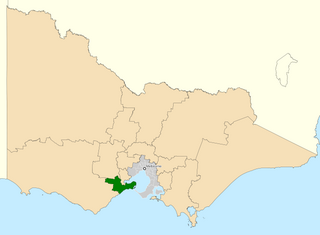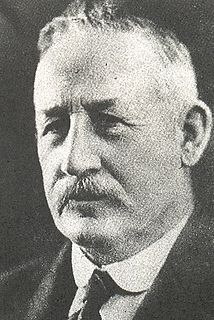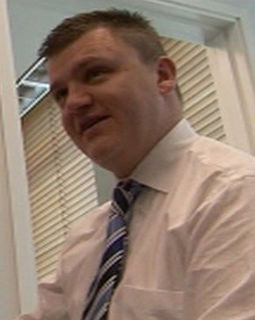Related Research Articles
The National Party of Australia (NPA), also known as The Nationals or The Nats, is an Australian political party. Traditionally representing graziers, farmers, and regional voters generally, it began as the Australian Country Party (ACP) in 1920 at a federal level. It later adopted the name National Country Party in 1975, before taking its current name in 1982.

The Nationalist Party, also known as the National Party was an Australian political party. It was formed on 17 February 1917 from a merger between the Commonwealth Liberal Party and the National Labor Party, the latter formed by Prime Minister Billy Hughes and his supporters after the 1916 Labor Party split over World War I conscription. The Nationalist Party was in government until electoral defeat in 1929. From that time it was the main opposition to the Labor Party until it merged with pro-Joseph Lyons Labor defectors to form the United Australia Party (UAP) in 1931. The party is a direct ancestor of the Liberal Party of Australia, the main centre-right party in Australia.

The Division of Corangamite is an Australian electoral division in the state of Victoria. The division was proclaimed in 1900, and was one of the original 65 divisions to be contested at the first federal election. It is named for Lake Corangamite, although the lake no longer falls within the division's boundaries.

The Liberal–National Coalition, commonly known simply as "the Coalition", is an alliance of centre-right political parties that forms one of the two major groupings in Australian federal politics. The two partners in the Coalition are the Liberal Party of Australia and the National Party of Australia. Its main opponent is the Australian Labor Party (ALP); the two forces are often regarded as operating in a two-party system. The Coalition was last in government from the 2013 federal election, before being unsuccessful at re-election in the 2022 Australian federal election. The group was led by Scott Morrison until the 2022 Australian federal election, where he resigned as leader. His successor is to be determined.

John Allan was an Australian politician who served as the 29th Premier of Victoria. He was born near Lancefield, where his father was a farmer of Scottish origin, and educated at state schools. He took up wheat and dairy farming at Wyuna and was director of a butter factory at Kyabram. In 1892 he married Annie Stewart, with whom he had six children.

The electoral district of Polwarth is an electoral district of the Victorian Legislative Assembly. It is located in south-west rural Victoria, west of Geelong, and covers the Colac and Corangamite local government areas (LGA), parts of the Moyne, Golden Plains and Surf Coast LGAs, and slivers of the Ararat and Greater Geelong LGAs, running along the Great Ocean Road taking in Anglesea, Cape Otway, Peterborough, Aireys Inlet, Lorne, Wye River, Apollo Bay and Port Campbell, covering the inland towns of Winchelsea, Colac, Camperdown and Terang along the Princes Highway, and Inverleigh, Cressy, Lismore and Mortlake on the Hamilton Highway, and finally, includes the Otway Ranges and Lake Corangamite.

The 1931 Australian federal election was held in Australia on 19 December 1931. All 75 seats in the House of Representatives and 18 of the 36 seats in the Senate were up for election.

The 1919 Australian federal election was held on 13 December 1919 to elect members to the Parliament of Australia. All 75 seats in the House of Representatives and 19 of the 36 seats in the Senate were up for election. The incumbent Nationalist Party government won re-election, with Prime Minister Billy Hughes continuing in office.

The 1917 Australian federal election was held in Australia on 5 May 1917. All 75 seats in the House of Representatives and 18 of the 36 seats in the Senate were up for election. The incumbent Nationalist Party, led by Prime Minister Billy Hughes, defeated the opposition Labor Party led by Frank Tudor in a landslide.
The 1918 Swan by-election was a by-election for the Division of Swan in the Australian House of Representatives, following the death of the sitting member Sir John Forrest. Held on 26 October 1918, the by-election led to the election of the youngest person to be elected until 2010 to the Parliament of Australia, Edwin Corboy. It saw the conservative vote split between the Country Party and the Nationalist Party, which directly prompted the introduction of preferential voting in Australia.
The Victorian Farmers' Union (VFU) was an association of farmers and primary producers formed in 1914 in the Australian state of Victoria. Although initially formed as an "absolutely non-political" entity, the VFU became a political party in 1916, and nominated candidates for the 1917 state election and subsequent elections. In later years it used the names Victorian Country Party, then United Country Party and is now the National Party of Australia – Victoria. At the 1917 election, because the support for the VFU was concentrated in rural seats, it won four of the 11 seats in the Victorian Legislative Assembly it contested, gaining about 6% of the vote state-wide. In 1918 it also won its first seat in the federal parliament, after preferential voting was introduced. At the 1920 state election the VFU vote increased to 8% and the number of seats to 13, giving the VFU the balance of power in the state Legislative Assembly.

Darren Leicester Cheeseman is an Australian politician. He has been a Labor Party member of the Victorian Legislative Assembly since November 2018, representing the seat of South Barwon. He previously held the federal seat of Corangamite from 2007 to 2013.
In parliamentary politics, balance of power is a situation in which one or more members of a parliamentary or similar chamber can by their uncommitted vote enable a party to attain and remain in minority government. The term may also be applied to the members who hold that position. The members holding the balance of power may guarantee their support for a government by either joining it in a coalition government or by an assurance that they will vote against any motion of no confidence in the government or will abstain in such a vote. In return for such a commitment, such members may demand legislative or policy commitments from the party they are to support. A person or party may also hold a balance of power in a chamber without any commitment to government, in which case both the government and opposition groupings may on occasion need to negotiate for that person's or party's support.
The National Party of Australia (WA) Inc, branded The Nationals WA, is a political party in Western Australia. It is affiliated with the National Party of Australia but maintains a separate structure and identity. Since the 2021 state election, the Nationals WA was the senior party in an opposition alliance with WA Liberal Party in the WA Parliament. Prior to the election, the National Party was sitting in the crossbench and the Liberal Party was the sole opposition party. The election resulted in the National Party winning more seats than the Liberal Party and gaining official opposition status. Under the opposition alliance, the National Party leader and deputy leader would be the opposition leader and deputy opposition leader respectively, the first since 1947, and each party would maintain their independence from each other.

The 1922 Tasmanian state election was held on 10 June 1922 in the Australian state of Tasmania to elect 30 members of the Tasmanian House of Assembly. The election used the Hare-Clark proportional representation system — six members were elected from each of five electorates.
This article provides information on candidates who stood for the 1919 Australian federal election. The election was held on 13 December 1919.

Sarah Moya Henderson is an Australian politician, lawyer and former journalist. She has been a Senator for Victoria since September 2019, representing the Liberal Party. She previously held the Division of Corangamite in the House of Representatives from 2013 to 2019.

The 1917 Victorian state election was held in the Australian state of Victoria on Thursday 15 November 1917 for the state's Legislative Assembly. 51 of the 65 Legislative Assembly seats were contested.
The Australian Labor Party , commonly known as Victorian Labor, is the semi-autonomous Victorian branch of the Australian Labor Party (ALP). The Victorian branch comprises two major wings: the parliamentary wing and the organisational wing. The parliamentary wing comprising all elected party members in the Legislative Assembly and Legislative Council, which when they meet collectively constitute the party caucus. The parliamentary leader is elected from and by the caucus, and party factions have a strong influence in the election of the leader. The leader's position is dependent on the continuing support of the caucus and the leader may be deposed by failing to win a vote of confidence of parliamentary members. By convention, the premier sits in the Legislative Assembly, and is the leader of the party controlling a majority in that house. The party leader also typically is a member of the Assembly, though this is not a strict party constitutional requirement.